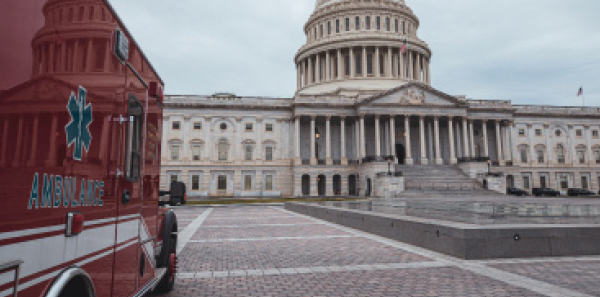
We thought the end of 2020 brought an end our multi year battle over out-of-network (OON) billing through Congressional passage of the No Surprises Act. ACEP considered it a solid win that this comprehensive bill to ban balance billing for OON care was coupled with a fair independent dispute resolution (IDR) process to ensure clinicians and facilities are paid appropriately for OON services delivered.
The language of the No Surprises Act laid a clear path for the regulatory phase of the implementation process, giving federal agencies a little over a year to act before the requirements took effect in 2022. Even before federal agencies issued any regulations, ACEP and other partners submitted letters and met with administration officials to discuss key policy and operational aspects of the law and provide recommendations on how to appropriately implement them. In mid-2021, we saw some of our efforts come to fruition.
On July 1, federal agencies released the first interim final rule (IFR) implementing the law, which included strong language endorsed by ACEP that enforces the prudent layperson standard. The rule states that denying emergency coverage based on a retroactive review of diagnosis codes is inconsistent with the emergency services requirements of the No Surprises Act and the Affordable Care Act. This win was the result of our past federal and state level advocacy efforts on the prudent layperson standard—as part of the rationale for including the policy, the rule specifically refers to ACEP’s lawsuit against Blue Cross & Blue Shield of Georgia.
Unfortunately, federal agencies chose to ignore most of the other major policy recommendations that ACEP and the broader physician community made. When the second IFR for the No Surprises Act was released at the end of September 2021, ACEP and many other groups involved were shocked to see that it went against congressional intent by undoing key components of the No Surprises Act’s IDR provisions.
ACEP and many others worked hard with Congress to ensure a final bill that protects patients from surprise bills while providing a robust IDR process. The purpose of IDR is to facilitate a fair interaction between parties once patients are out of the middle of billing disputes. However, the second IFR did the opposite: by requiring arbiters to greatly prioritize the artificially-low Qualified Payment Amount (essentially the median in-network rate) set by insurance companies it undermines the entire IDR process in the bill. This flawed regulation is expected to encourage insurance companies to narrow their networks even further, making it harder for patients to get emergency care, particularly in small or rural communities. We are already seeing this playing out since the rule’s release, with some health plans unilaterally canceling long-standing contracts with emergency physician groups and pushing them out of network.
ACEP immediately launched an all-out blitz to push back against the flawed process put forth in the regulation. Find a full timeline of ACEP’s OON advocacy progress, plus links to the supporting documentation, at acep.org/surprise-billing, but here’s a quick breakdown of the latest push:
- Oct. 1: ACEP issues a statement strongly and publicly voicing our disappointment that the regulations are almost entirely inconsistent with Congressional intent to create a fair and unbiased process to resolve billing disputes.
- Oct. 14: ACEP hosts Surprise Billing Town Hall to update members on the second IFR and discuss advocacy strategy.
- Oct. 15: ACEP and additional medical organizations meet with key federal leaders to discuss concerns about the second IFR.
- Nov. 5: Reps. Tom Suozzi (D-NY), Brad Wenstrup, DPM (R-OH), Raul Ruiz, MD (D-CA), and Larry Bucshon, MD (R-IN) send a letter to HHS urging them to amend the second interim final rule. ACEP members sent 5,297 messages to Congress asking them to support the letter, which was cosigned by 152 bipartisan members.
- Nov. 11: ACEP and EDPMA submit an initial response to the second interim final rule implementing the No Surprises Act, followed by a comprehensive response on Dec. 6.
- Dec. 9: ACEP publicly supports the goals of the lawsuit filed by the American Medical Association and the American Hospital Association against the Departments of Labor, Treasury, and Health and Human Services.
- Dec. 22: ACEP joined with the American College of Radiology and the American Society of Anesthesiologists to file a lawsuit against the government charging that the IFR goes against the language of the No Surprises Act and will ultimately harm patients and access to care.
“It is deeply troubling that the administration would upend the deliberately balanced mechanism to resolve billing disputes established by Congress as part of the No Surprises Act. We are left with a law that will tilt market forces in favor of insurers and they are already exploiting their newfound incentive to push emergency physicians out of network,” ACEP President Gillian Schmitz, MD, FACEP, said. “Legal remedy is necessary so that the IFR does not undermine the entire dispute resolution process.”
This flawed IFR was issued without the customary comment period given to most federal regulations that allows organizations like ACEP to weigh in. Our lawsuit asks that the federal government be required to rescind the second IFR. This will compel the government to go start again, this time providing an opportunity for ACEP and other medical organizations to provide important feedback on the regulation.
We are waiting for the federal government to file its response to the lawsuit and are closely watching the progress of the other, similar legal actions against this IFR that have been filed by physician groups and other providers in other states because those outcomes will be influential on other pending cases. We’ll keep you posted as the lawsuit moves forward.
Meanwhile, keep in mind that the ban on balance billing and the other patient protections from the No Surprises Act are now in place—and won’t be impacted by our lawsuit. It is important for you to comply with these requirements, and ACEP has created a webpage to help you better understand them. Learn more on page 21.
Finally, surprise billing advocacy happens also on the state level. As of December 20, 2021, 19 states had introduced 37 bills related to out-of-network billing. ACEP’s state legislative staff are working directly with ACEP chapters to support state-level advocacy. Contact your local chapter to see how you can make an impact at the state level, and join the 911 Grassroots Network to stay apprised of ACEP’s federal advocacy efforts.
Pages: 1 2 | Multi-Page





One Response to “ACEP Sues Federal Government Over Implementation of No Surprises Act”
February 20, 2022
Concerned ER docWould be important to know sense of magnitude on how many insurers dropped EM groups as result of updated regulations.